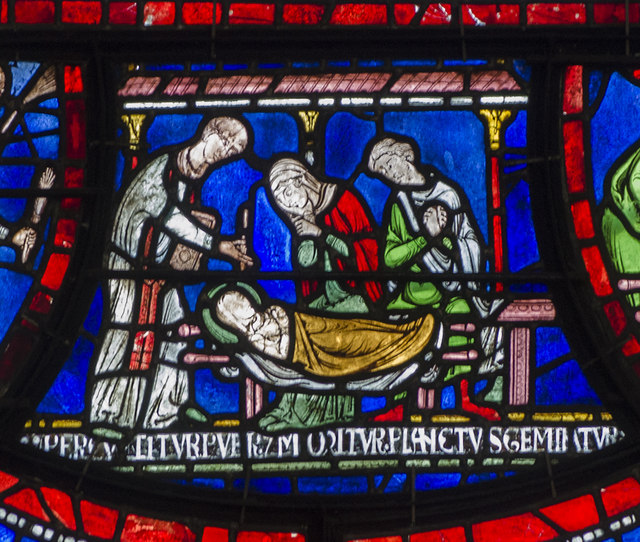At Canterbury Cathedral there is a window that tells the story of Sir Jordan Fitz-Eisulf:
Jordan, the son of Eisulf, was a Knight of "great name" according to the record of the miracles by Benedict of Peterborough. He was a friend of Beckett.
Plague struck his house and Brito (Britonis), the nurse to his 10-year-old son William died. The boy was also taken ill, and he died a week later. A priest came, and a vigil was held overnight at William's bedside.
That day some pilgrims who had been to the tomb of St Thomas came to the house and given hospitality because of Jordan's belief in the Saint.
They bought with them "water of St Thomas", which Jordan asked to be poured into his dead son's mouth "in case the martyr may give me back my son".
The priest poured the water in thinking Jordan had gone mad for requesting this. Nothing happened. Still Jordan refused to let his son be buried, even though it was two days since he had died. Sure that Saint Thomas would intervene, Jordan forced his sons teeth apart with a knife and poured more water in.
This time the boy responded. Jordan sat him up, so that the water might pass down his throat. He boy eventually opened one eye and said "why lament father? Why weep lady? Be not sad. See, Thomas the Martyr has given me back to you"
His father then vowed to take him to see the Martyr's tomb at Lent, giving him two pieces of silver and keeping some for himself and his wife as offerings. The appointed time came, and they did not go.
Saint Thomas then appeared to a leper called Gimpe, who lived near Jordan's house, telling him to go and warn Jordan that, unless he fulfilled his promise, he would experience as much sorrow as he had felt joy at his son's revival, through the loss of another son.
The leper resisted, complaining that he was blind and infirm, but St Thomas appeared to him a second time, saying he should tell a priest to inform Jordan. The priest dismissed the leper's vision as a dream and did not go to Jordan. The Saint appeared to the leper yet again, finally telling him to send his daughter to fetch Jordan and his wife so the leper could tell them all that had happened. This took place, but the Knight's Lord, the Earl of Warrenne arrived, preventing the pilgrimage to Canterbury.
Because Jordan failed to keep his promise, another of his sons died with the plague, and the parents themselves then became ill. About twenty people in Jordan's house became unwell. Jordan then insisted that he and his wife go to Canterbury: "living or dead, we will both go to the Martyr". They were sustained by the water of St Thomas on the way, and when they saw the distant Cathedral, Jordan's wife walked barefoot for the last three miles of their journey to the tomb. Jordan emptied gold and silver coins on the tomb, the vow accomplished.
What is the difference between this and soft polytheism?
"The Martyr" gave him back his son, the sought vengeance against Jordan for not going on pilgrimage and honouring the Saint. Once the debt to "the martyr" was fulfilled they regained his favour and were restored to health. There is no invocation of God. In medieval times relics were ascribed magical powers also.
This might not be representative of modern Christianity, but I can't really see much of a difference between this and soft polytheism. But then again, I suppose the difference is very much in the eye of the beholder.

